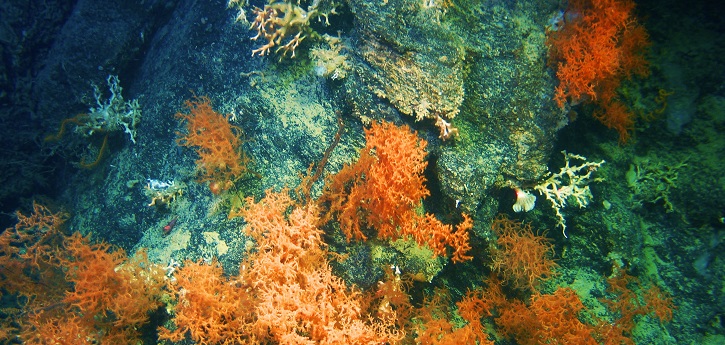2015 Press Releases
Discovery of new habitat for corals in the Porcupine Bank Canyon

An international team of scientists led by Prof Andy Wheeler of UCC has discovered a new cold-water coral habitat in Irish waters possibly doubling the amount of cold-water corals previously thought to exist in Irish waters.
While on the Marine Institute’s RV Celtic Explorer during the QuERCi survey on Irish cold-water coral reefs, Prof Andy Wheeler investigated a submerged vertical cliff 800m below the sea surface and found it covered in cold-water coral. “The seabed just falls away into a deep chasm. We couldn’t wait to take a look down there, using the Holland I remotely-operated vehicle, which is equipped with cameras and robotic sampling arms.” said Prof Andy Wheeler.
Prof Wheeler and his team have been investigating Irish cold-water coral reefs for over 15 years. In the deep, cold, dark Atlantic these corals form reef habitats supporting a diverse and abundant ecosystem. It was while mapping and inspecting some previously unconfirmed reefs on the edge of the Porcupine Bank Canyon, 300km offshore from Dingle, that the scientists decided to venture further into the canyon itself.
The ROV Holland I was manoeuvred from 2100m water depth in the middle of the canyon, up the canyon wall to the coral reefs clustered around the canyon top at 700m water depth. The bottom of the canyon was choked with organic-rich particles flushing down the canyon on the way to the abyssal plain. “It was like flying the ROV through a snow blizzard” said Dr. Chris McGonigle (Ulster University), “but we just pushed up the canyon and it got steeper and steeper and steeper until we faced this vertical cliff face several hundred metres high.”
The cliff face, never seen by humans before, was covered in corals and other associated organisms. “These near vertical habitats hardly feature on maps yet can be hundreds of metres high and extend for tens of km. This is a massive habitat, barely explored, yet full of ocean life”, said Dr. Agostina Vertino (University of Milan-Bicocca) “We found many species of coral, sponges, crabs and fish”.
“The Porcupine Bank has 500km of cliff habitat at this water depth. Corals were found between 900 and 700m water depth”, explained Prof Wheeler, “It is not unfeasible that there is over 100km2 of coral habitat that was previously unaccounted for.”
The coral discovery site has already been designated a Special Area of Conservation due to coral reefs in the vicinity. Despite its protection, the international team lead by Prof. Wheeler found snagged fishing gear and litter. “It is a great shame, we are the first people to see this place yet despite of its remoteness there is still evidence of human impacts”, said Prof Andy Wheeler.
The RV Celtic Explorer is Ireland’s state-of-the-art research vessel and has been recently equipped with new seabed mapping sonars giving unprecedented views of the seabed. The ship is also the dive platform for the Holland I ROV. “The quality of the data that this ship and ROV can now collect is phenomenal. We were seeing details on the seabed that a few years ago we could only have dreamed of”, said Dr Chris McGonigle (University of Ulster), “This increase in data quality will allow us to develop a much greater understanding of the processes controlling the distribution of life in these unique environments.”
Congratulating the Prof Wheeler and the team on their discoveries, Mick Gillooly, Director of the Marine Institute said “we are delighted to see the recent upgrade of the Celtic Explorer’s and the ROV Holland’s multibeam sonar suite producing such amazing results for this expedition. The high resolution images produced are fundamental in helping scientists with their research as well as helping us provide a better understanding our ocean.
For more information and images of the corals found on the Porcupine bank, see the Scientistsatsea.blogspot (12th June – 22nd June 2015):
http://scientistsatsea.blogspot.ie/2015/06/querci-survey-quantifying-environmental.html
Also our student blog:
http://blogs.ucc.ie/wordpress/bees/2015/06/
This research survey is supported by the Marine Institute and is funded under the Marine Research Sub-Programme by the Irish Government.
